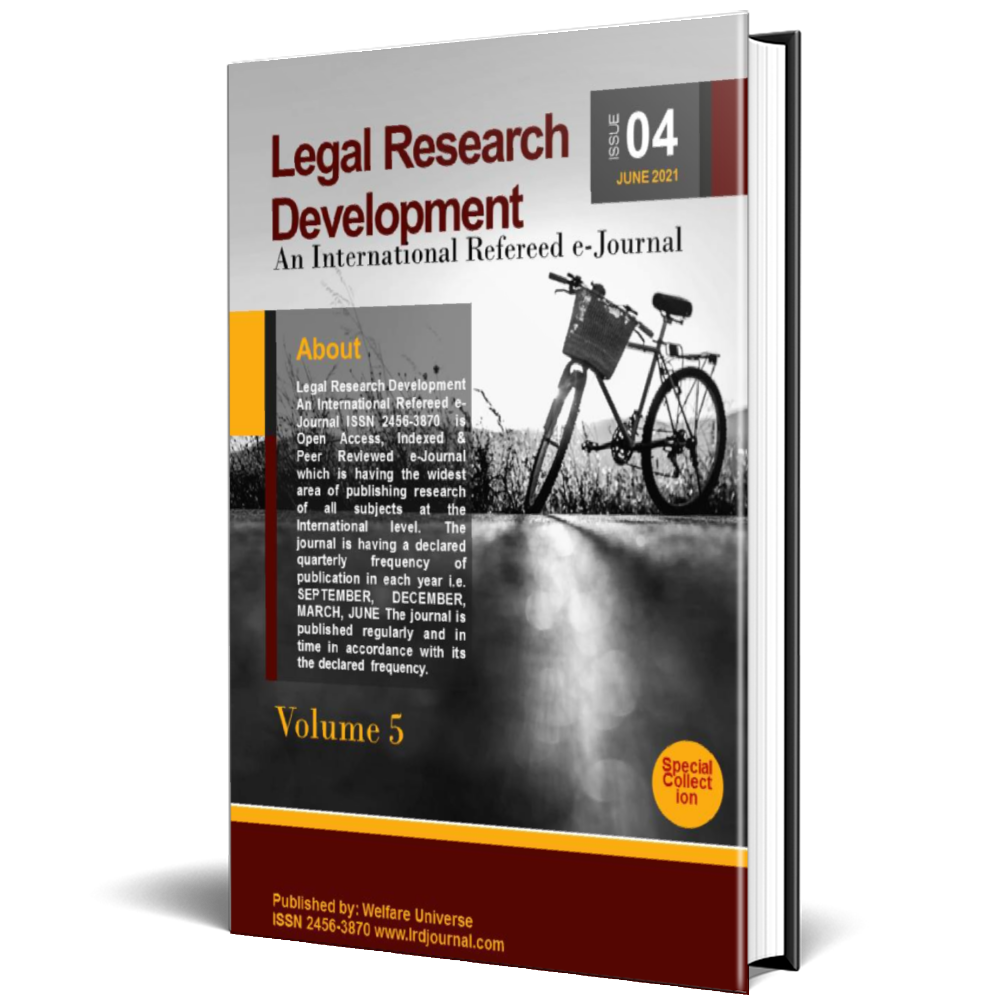Evolution and Development of Industrial Jurisprudence in India
DOI:
https://doi.org/10.53724/lrd/v4n1.05Keywords:
Joint venture,, Tipple test,, Social justice,, Legal philosophy,, Compensation,, Social transformation and good governance,, Democracy,, International Convention etc.Abstract
Industrial jurisprudence is an ideology to study the perspective and perception of those legislators who give the shape to be a labour legislation for governing the relation of workmen and employers. It is correctly said by Mahatma Ganghi that industry is the joint venture of workmen and employers. In the Hospital Mazdoor Sabha1 case the triple test theory introduced and it was reiterated and set up in the case of Banglore Water Supply2. In both cases the cooperation of workmen is made essential part to be any industry. The industrial jurisprudence provides the thinking to make the labour laws accordingly. When the laissez faire theory wiped out and placed the welfare state, workers has become the integral part of any industry. With this view the state made the labour legislation for governing the relation of workmen and employers. It has been felt by most of the country of world that there must be apply tripartism; it means state will interfere with the labour regulations to settle the both relations. For this purpose state made the various laws, which are existed. In June 1998the International Conference proposed the fundamental labour policy for the World. Certain points of hose policy are existed in Indian labour jurisprudence. First, freedom of association, second, right to collective bargaining, third, elimination of all forms of forced or compulsory labour, fourth abolition of child labour and fifth, elimination of discrimination in respect of employment and occupation. Industrial jurisprudence is more dynamic for industrial governance. With this ideology, the State utilizes the modus operandi accordance with the need of regulation for harmonious relation between employers and employees. When the Constitution of India commenced the concept of social justice gave the pace to the welfare labour legislation. The outcome of concept, the social assurance and social assistance are also prevalent with the ideology of social justice. It is the spirit of the Constitution. Now, it is being expected that there will be dynamic change in industrial jurisprudence by introducing the new economic policy for the upliftment of industry as well as labours. It not need to be panic the new exit policy will destroy the fundamental rights of the workers.
References
Chandra; Mahesh, Industrial Jurisprudence (1976) p. 31.
Report of the National Commission on Labour, (1969), p. 56.
Mishra; Prof. S. N., Labour and Industrial Laws, 25th Ed. 2009 p. 3.
Chandra; Mahesh, Industrial Jurisprudence p. 40.
Ibid. p. 49.
Ibid. p. 5.
Chakravarthi; K. P., Labour Management and Industrial Relations, 1988, p 1.
Rao; E. M., Industrial Jurisprudence, First Ed. Pp. Vii and viii.
Rao; Prof. E. M., Industrial Jurisprudence, First Ed. 2003, P.- Lexis Nexis p. viii.
Teller; Ludwig, Labour Dispute and Collective Bargaining, Vol. I., P. 536.
Sinha; Justice S. B., Emerging Industrial Relations, Article Published in NYAY DEEP P. 45.
26th Session of ILO in Philadelphia held on 10th March 1944.
Malthus, T. R.; Theory of the Constant Value of Labour.
Sec. 4 of the Employees Compensation Act, 1923.
Sec. 25-F of I.D. Act, 1947.
Sec. 25-B of I. D. Act, 1947.
Harold Joseph Laski qoutes.
Singh, V.B., Edition- 1963 ‘Labour and Labour Relations’, ILI P-9.
K. Ramaswamy J, Air India Statutory Corporation V. United Labour Union (1997) I LLJ 1113, 1135 (SC).
Gajendragadkar J, J. K. Cotton Spg & Wvg Mills Co. Ltd. V. LAT (1996) II LLJ 436, 444 (SC).
Report of National Commission on Labour, 1969, P-162.
Meenu Paul’s published Article, “Chapter V-B of the I.D. Act, 1947: Significance for the Industrial Workers in India in the Era of Globalization “ (2005) III LLJ p. 33.
Harold Joseph Laski qoutes.
Downloads
Published
How to Cite
Issue
Section
License

This work is licensed under a Creative Commons Attribution-NonCommercial 4.0 International License.










